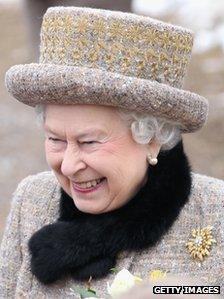Royal role in independence debate
- Published

A 21-gun salute was fired at Edinburgh Castle to mark the 60th anniversary
From Scotland come widespread congratulations to Her Majesty the Queen on the 60th anniversary of her accession to the throne.
Most obviously, a 21-gun salute from the ramparts of Edinburgh Castle. Less volubly, messages of support from Scotland's politicians and people.
That is not to say that the body politic in Scotland is uniformly monarchist - or, indeed, the populace. Far from it. But even sceptical political leaders in Scotland long since concluded that there are few electoral advantages - and much to lose - in picking a fight with the Crown, far less the present incumbent.
That applies to those who wish to repeal the Union of Parliaments, as much as to those who wish to retain it.
The SNP leadership is in the business of offering reassurance along with its policy of independence. Hence, the talk of a continuing social union with people in England. Hence, the offer of continuing membership of the European Union - although the EU has become a harder sell of late.
The argument is that Scotland would not be leaving, but joining. Joining the EU on equal terms. Joining a new relationship across these islands.
The party leadership has even occasionally contemplated cementing that concept of joining by suggesting, delicately, that the SNP might end its policy of quitting NATO. Who knows, they may try again on that one - although it tends to produce an emotive, visceral backlash within their own ranks.
But the monarchy is at the very core of this concept of reassurance. Bending the knee and bowing the head does not come naturally to many political leaders, including Alex Salmond.
However, Mr Salmond knows very well that the SNP must avoid distressing the populace overmuch if it is to win support for the notion of political independence. That means sustaining existing institutions as far as possible consistent with independence.
Hence the monarchy. Mr Salmond repeatedly stresses that his aim is to repeal the Parliamentary Union of 1707, not the regal Union of 1603 when the Scottish king assumed the English throne as well.
The SNP used to hold that the monarchy would be retained in an independent Scotland, pending a popular referendum. In practice, that element of a post-independence referendum is set aside. Mr Salmond says simply that the Crown would stay, that Scotland and England would share a sovereign even although they would be independent states.
The attitude of the Crown towards the SNP and, more generally, the devolved Parliament at Holyrood has also been fascinating. Much of Whitehall found it hard to adjust. Still does sometimes. The Palace got it from day one.
Glance through the speeches delivered on the occasions when Her Majesty has opened the sundry devolved Parliaments thus far. Compare that with the remarks she made in 1977 on the occasion of her Silver Jubilee address to both Houses of Parliament at Westminster.
Then, in the midst of SNP advance and talk of devolution, she told MPs and peers: "I number Kings and Queens of England and of Scotland, and Princes of Wales among my ancestors and so I can readily understand these aspirations.
"But I cannot forget that I was crowned Queen of the United Kingdom of Great Britain and Northern Ireland."
That was, rightly, interpreted then as an expression of disquiet from the Palace at prevailing circumstances in Scotland.
'Queen of Scots'
By contrast, her speeches to MSPs, in Aberdeen, on the Mound and then at Holyrood, tread a more cautious and subtle diplomatic path between stressing the distinct nature of Scotland and placing that distinction within a wider British context.
Just one example will suffice, from the speech in 2003. She said then that the devolved legislature was "distinctly Scottish". She added that it was "a modern reaffirmation of the ancient bond that has linked Crown, Parliament and people for hundreds of years."
A reference there to the Scottish concept of monarchy being with the consent of the people - emphasised in the remarks by then Presiding Officer, George Reid, who referred to Her Majesty as "our Queen of Scots".
But, in the same address, the Queen also noted that the character and strength of the Scottish people had "contributed greatly to the life of the United Kingdom, the Commonwealth and indeed the world." A distinct Scotland, then, but within the Union.
The issue of monarchy has contemporary salience for the independence debate. Firstly, because it is part of the offer from the Nationalists that the Crown would be sustained.
But, secondly, because it features within the serious and substantive debate over the wording of the question to be posed.
Some want the question to stress that the United Kingdom would be ended by Scottish independence. Nationalists, understandably from their perspective, do not want any words such as "end" or "leave" to feature on the ballot paper: too distressing to the voters.
And so Mr Salmond sought to argue that the United Kingdom would be sustained in the person of Her Majesty and the continuing institution of the shared Crown.
This drew derision from his political opponents who say that the dissolution of the Parliamentary Union would indeed involve an ending, a breach.
Beneath that debate lies the core argument: under independence, what would be gained, what lost and what retained. In that argument, the monarchy is central.